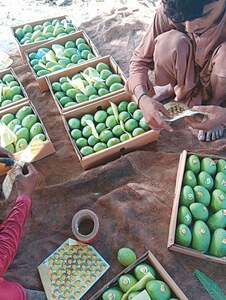• Claim growers are not paid official rate of Rs8,500 per maund
• PCGA demands tax waivers, cheaper power
LAHORE: Ginners have decided to suspend buying raw cotton from farmers across the country after district commissioners in the cotton belt, both in Sindh and Punjab, directed them to pay the growers not less than Rs8,500 per maund.
Provincial governments of Sindh and Punjab through the district administrations had asked the ginning factories to pay at least Rs8,500 per maund, the minimum support price fixed by the federal government, to the cotton growers or face closure of their mills.
Manzoor Wassan, the adviser to the Sindh chief minister on agriculture, was quoted as saying that the action was initiated after receiving complaints from growers in Sanghar, Mirpur Khas, Nawabshah, Khairpur and other districts that they were being paid only Rs6,500 against the official price of Rs8,500 per maund. Similar reports were received from Vehari, Rahim Yar Khan, Bahawalnagar and other cotton-growing districts in Punjab.
Some TV channels also quoted former president Asif Ali Zardari as expressing his concerns at farmers’ complaints and accusing the federal government of not taking steps to ensure the payment of Rs8,500 per maund price fixed by it in consultation with the textile industry before the advent of the cotton season.
Ginners’ demands
A meeting of the central executive committee of the Pakistan Cotton Ginners Association (PCGA) held in Multan on Thursday with Chaudhry Waheed in chair decided to suspend raw cotton buying until their demands, which include withdrawal of sales tax on banola (rapeseed) and not forcing ginners to buy cotton at a certain price, are not met with.
The ginners said that it was the government that was to ensure the payment of Rs8,500 cotton intervention price by introducing the Trading Corporation of Pakistan (TCP) as the second player in the market and not the private sector.
They said that the millers are also paying Rs50 per unit of electricity, while mark-up rates on their loans have also become unbearable.
Inviting the growers to join them in their struggle against the government, Mr Waheed said in a statement that half of the ginning factories had closed their business because of higher tax rates with the minimum facilities.
Ex-PCGA chairman Dr Jassomal Lemani said they had told the Sanghar deputy commissioner that the ginners could pay the growers for their raw cotton at the rate that was being offered in the market for the ginners’ products: rapeseed and cotton. He said the TCP should purchase cotton and rapeseed from the ginners at a rate that would enable them to pay Rs8,500 per maund to the growers.
Earlier in the day, Sindh Abadgar Ittehad representatives told a press conference in Hyderabad that ginners in Sindh were not paying cotton growers the official price of Rs8,500.
Nawaz Zubair Talpur, Zafarullah Talpur, Anwar Kamboh and others claimed that ginners in Punjab were paying Rs9,500 per maund to the growers while their counterparts in Sindh were doing injustice to the farming community which was being paid Rs6,000 per maund for its raw cotton, while illegal deductions of two kg by dealers and one kg by ginning factories were being made in the cotton crop supplied to them.
Referring to the excuse of higher business costs being offered by the PCGA, they said the input cost of farming has also shot up as the power tariff for tube wells has gone up to Rs45 per unit and DAP fertiliser is being sold for Rs12,000 per 50kg bag but the farmers are not using it to seek better cotton rates.
Published in Dawn, July 7th, 2023














































Dear visitor, the comments section is undergoing an overhaul and will return soon.